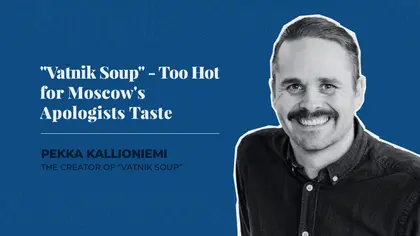Vatnik Soup kicked off in 2022 and quickly became an internet sensation as it detailed the lives of different Russian propagandists and explained to readers who were the key players disseminating the Kremlin's narratives. Not everyone was equally as enthralled as Vatnik Soup's loyal readers: Some pro-Russian speakers highlighted in the series have threatened to sue its creator. After 200 episodes, Vatnik Soup is drawing to a close, however - there is still more work to be done in exposing those who spread Russia's mistruths.
Kyiv Post’s special correspondent Jason Jay Smart has interviewed the creator of “Vatnik Soup,” Pekka Kallioniemi
JOIN US ON TELEGRAM
Follow our coverage of the war on the @Kyivpost_official.
What is Vatnik Soup?
Vatnik Soup is a Twitter series I started in October 2022. I had recently joined Twitter and felt like I was constantly running into the same arguments and false information regarding the situation in Ukraine, and decided to start writing threads (or micro blog articles) which would shed light on so-called "vatniks" - referring to people who believe and/or promote pro-Kremlin propaganda.
For some reason, these Vatnik soup "mini-blogs" quickly became quite popular, so I decided to keep on writing. Eventually I also expanded to writing about how online information operations work in general. Frankly, how we got the name, "Vatnik Soup," was suggested to me by another Twitter user - it had a nice ring to it, so I decided to start and use it.

Russian Spy Ship Spotted Off British Coast – UK Defence Secretary
How has the reaction been? How have the Russian propagandists reacted?
The reaction has been extremely positive among readers. People have been very supportive of the project, especially after I was threatened with a legal action by one of the subjects of my threads. I still have a hard time believing how popular the series has become.
Does this work relate to your day job?
Not really. My day job is related to state-of-the-art and future technologies, but I have been conducting research on social media platforms since 2020. The topic of propaganda, especially online, has interested me since forever, and once I finally got the chance to study it through a research grant, I was ecstatic. Vatnik Soup is just a continuation of that research, but more as a hobby.
What commonalities have you discovered among the Russian propagandists?
There's only a handful of narratives (for example, bioweapons labs, "Ukrainian Nazis", "proxy war with NATO", sanctions hurting Russia more than the West...), and many propagandists propagate these same tropes ad nauseam. Of course, some of them believe this nonsense, but there's also those who spread it just for the money or for fame.
Why do you think that support for Ukraine is so strong in your native Finland?
The Soviet Union invaded Finland in November 1939 after staging a false flag attack near the Soviet village of Mainila. This war became known as the Winter War, and it has similarities with the ongoing war in Ukraine.
Unfortunately, Finland lost around 10% of its territory to the USSR - something that will surely not happen with Ukraine. A large majority of Finns support the Ukrainian war effort, and I’m sure that we will send Ukraine military and humanitarian aid as long as it is necessary.
Your work is impressively well researched and well documented: How much time do you put into every new episode?
One episode can take anything from weeks to hours, depending on how familiar I am with the subject. I write everything by myself, but people sometimes help me with translations and data collection. When starting a new soup, data collection is the first phase, then analysis and fact-checking, and finally writing the text. The basic idea behind Vatnik Soup is that the texts shouldn't be too long, and I always try to use simple English - they should be easily and quickly digestible, like a soup.
You have done a lot of episodes - but you are closing down Vatnik Soup soon. Did you have an end-date in mind when you started Vatnik Soup?
No, I had zero plans at the beginning. First, I was writing only about Finnish Vatniks, introducing them to the international audience. After I expanded the series to foreign actors, the whole thing enthralled me. I was obsessed to find out more about the phenomenon, and I wanted to find connections between these people. I finally set the limit to 200, as I felt the thing would otherwise drag on for too long.
What have been your favorite topics to cover?
The whole ecosystem of "independent journalists" who report on the war has been interesting. Many of these people have had troubles in their past, and turning into pro-Kremlin propagandists has been a way to escape all that. My sources in Russia have told me that many of these people now live in St. Petersburg or in Moscow.
What future projects do you plan?
I will launch a YouTube channel, The Soup Central, in the near future. My plan is to do entertaining, visual, and more comprehensive videos on the same topics that I have covered in Vatnik Soup.
Pekka Kallioniemi (PhD) is a Finnish expert on social media and disinformation. He works as a postdoctoral researcher on human-technology interaction at Tampere University. In addition to researching state-of-the-art technologies, he's also studied Russian online information operations and disinformation.
Vatnik Soup can be found via his Twitter account (@P_Kallioniemi) and his YouTube channel (https://www.youtube.com/@TheSoupCentral).
You can also highlight the text and press Ctrl + Enter










